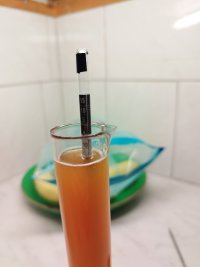Old ale has hit final gravity. Well, at least I hope it's hit final gravity, because it's at 1.013 down from 1.074. Seem to be getting a bit of sulphur dioxide off my copitch which I've not had with S-04/London before. Tasting great though- honey cake and orange marmalade. I'll be soft crashing it at 10ish C for 48 hours then kegging.
Split base of MO and Chev at 42% each, 8% golden syrup, 5% Extra Light Crystal, 2% Cara Gold and 1% Carafa Special. Magnum at 30, Fuggle and Jester at 5, and Olicana T45 plus some leftover Amarillo in the whirlpool.



